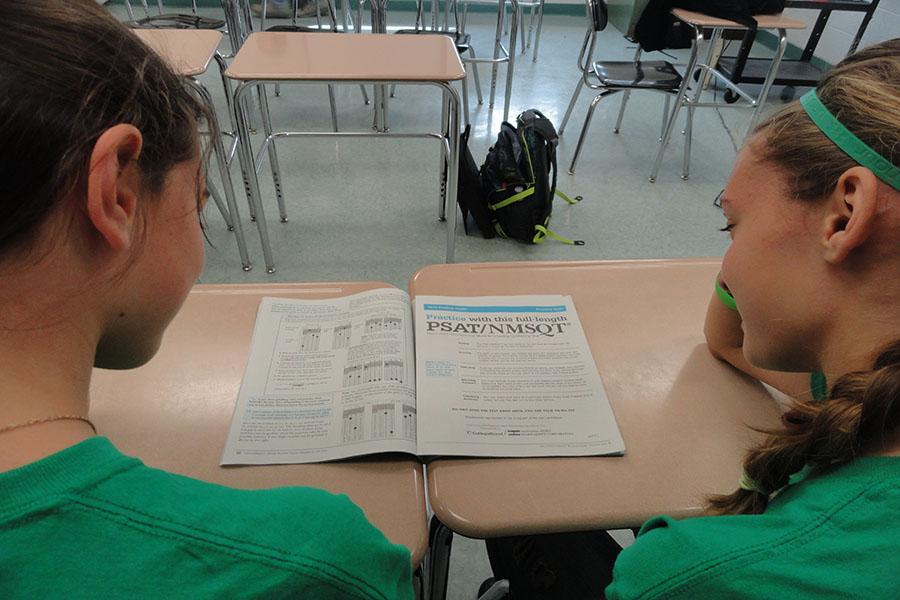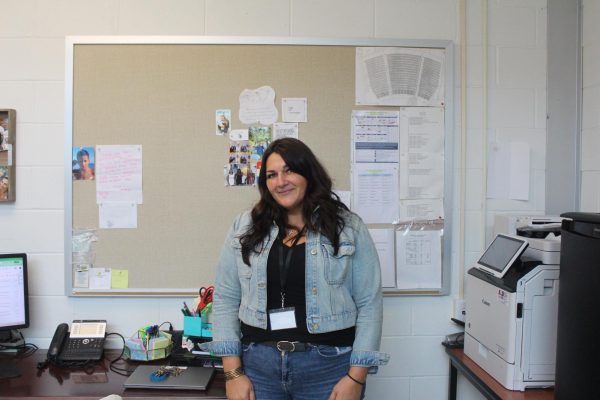Opinion: Don’t fret about the SATs
From left to right, sophmore Amy Santo and Carly Boyle take a peek at a PSAT booklet. SAT season can be a stressful time for students.
“Stupid!”
“Wrong.”
“Idiot mistake.”
“First grade math.”
“Really stupid!”
“Idiot!”
“Did you forget how to multiply- again?!”
These comments weren’t made by some disparaging teacher. These were things that I found myself writing in my SAT math practice book last year.
How had I gotten to the point where I was being so cruel to myself? I’d always enjoyed my classes and gotten good grades, so why was I feeling so helplessly stupid and hopeless all of a sudden?
It had begun to feel like my life boiled down to a test score. After reading my score report, I convinced myself that all my problems would be solved if I could raise my math score by just a hundred points. So every incorrect practice question felt like a slap in my face. With every wrong answer, I could feel my college dreams slipping through my fingers.
The thing is, nothing could be further from the truth. Every admissions officer I’ve ever talked to has said that there’s no hard and fast cut-off for admissible SAT scores, and some colleges don’t even look at SAT scores. One admissions reader told me, “We cover up the scores, make our judgments on the strength of the application, and check the scores later. We come up with the same verdict with or without the SAT scores.”
I decided to take a harder look at the supposedly all-important test, and some glaring problems stood out to me.
Firstly, it all began to seem so commercialized. At every turn on the website, the College Board suggests their official test prep books. You even have to view their online store while registering for the test. This is coming from an organization that makes hundreds of millions of dollars a year. I started to feel less like a student and more like a customer. Whole industries have sprung up around standardized testing, and the frenzy shows no signs of slowing. Test prep is a $4 billion industry, and it makes its money by preying on fear and insecurity.
Secondly, it’s long been argued that the tests are not accurate measurements of a student’s abilities. In an interview with Frontline, John Katzman of the Princeton Review suggests, “For most students, the problem is more the SAT itself than it is their math skill, their English skill or their ability to do college level work.”
It’s true — at SAT courses I attended, instructors seemed more worried about test-taking strategies than actual academics. I didn’t learn to understand the nuance of new vocabulary, but was taught to spit back definitions in 30 seconds or less. I didn’t learn new math. Instead, probability lessons were applied to scoring strategies.
So why was I letting College Board dictate my self worth? Because in today’s world of overachievers, I was made to feel that anything other than the best is worthless.
“You’re in the top twenty percent, that’s amazing,” said my mom, confused. “Why are you crying?”
“Because I need to be in the top five percent,” I bawled. Looking back, it seems like such a ridiculous thing to say, but that was really how I felt in the moment. And I know that five percent wouldn’t have felt like enough, either, or even one. The nature of over-achieving is that there will be no moment when students sit back and say they’re satisfied with what they’ve achieved. The SAT makes it easy to compare your performance to that of others, or to your previous performance. Instead of feeling proud of their abilities, students pick the test apart question by question, point by point, wondering what difference a couple of questions could make. By quantifying education, the SAT ignores the most important part of high school: giving students a love for knowledge and learning.
I wish I could attach a moral to this story and say that I learned to disregard our culture of testing and academic pressure, but I’d be lying. In the high-stress process of college admissions, it’s nearly impossible to reject the system. But I have learned to be much more forgiving of myself. Recently, I won an academic award, and my mother took me aside and very seriously said, “You haven’t changed between today and yesterday. You aren’t a different person. Do you understand?”
I did understand — I finally realized that my validation had to come from myself, not arbitrary scores. Just as winning an award didn’t make me any smarter, getting a score I wasn’t happy with didn’t make me any dumber.
I wish the SAT or the nature of standardized testing would change, but that doesn’t seem like it will happen any time soon. Instead, I hope students will stop stressing out so badly. I won’t ever find happiness in a test score, but I will find it in making peace with myself.












